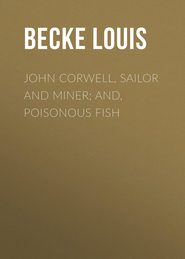По всем вопросам обращайтесь на: info@litportal.ru
(©) 2003-2024.
✖
Rodman The Boatsteerer And Other Stories
Настройки чтения
Размер шрифта
Высота строк
Поля
Prout grasped the old man’s hand, but shook his head.
“You are a generous man, Captain Hetherington, but I cannot do it. I am no seaman, and, what is more to the point, I have no money to put into the venture.”
“Thet’s jest it,” the American answered quickly, “but yew hev a long head—fer a Britisher, a darned long head—an’ I reckon yew an’ me will pull together bully; so jes’ tell the chief here to get the traps back inter the boat again, an’ yew an’ me an’ little Mercedy will get aboard agin–”
“No, no, no,” and the trader rose to his feet and walked quickly to and fro—“no, Hetherington; I cannot do as you wish. Here, among these islands, it is my wish to live; and here, or on such another island as this, and among such wild, uncivilised beings, must I die.”
“So?” and the hard-featured American raised his shaggy eyebrows interrogatively. “Waal, I reckon yew regulates your own affairs ter your own fancy; but look here, mister,” and the kindly ring in the old skipper’s voice appealed to the man before him—“what about little Mercedy? Yew ain’t agoin’ to let thet pore child grow up among naked, red-skinned savages, hey?”
A deep flush overspread the trader’s face, and then it paled again, and he ceased his hurried, agitated walk.
“Hetherington!… do not, I implore you, say another word to me on the subject. It is better for me to remain here with my little Mercedes.... So, here, give me that honest hand of yours and leave me.... But, stop, I forgot,” and he thrust his hand into a large canvas pouch that hung suspended from his shoulder, “I did indeed forget this, Captain; but forget the kindness that you have shown to me and my child during the four months I have been with you, I never can.”
The Yankee skipper’s face was visibly perturbed as he heard the jingle of money in the canvas pouch, and he worked his jaws violently, while his heavy, bushy brows met together as if he were in deep study, and uneasy mutterings escaped from his lips. Suddenly he rose and left his companion.
As he shambled away to the far end of the council-house, he caught sight of a number of native women and children advancing towards himself and his passenger. Foremost among them was the old woman Malineta, her lean and wrinkled face wreathed in smiles, for the white man’s child, whom she still carried, had placed one arm around her neck. As she drew near the American, the little one smiled and made as if she wished to go to him, or to her father who stood near by.
Holding out his arms to the child, the skipper took her from the old woman, and then he turned to Prout.
“Say, I’ve jest been reckonin’ up an’ I make out yew hev been jest four months aboard o’ my hooker thar, an’ I reckon thet twenty dollars a month ain’t more’n a fair an’ square deal.”
Again the red flush mantled to the trader’s brow. “No, no, Hetherington. I am poor, but not so poor that I should insult you by such an insignificant sum as that. Two hundred and fifty dollars I can give you easily, and freely and willingly,” and advancing to the captain he offered him a number of twenty-dollar gold pieces.
An angry “Pshaw!” burst from the captain. He thrust the proffered money aside, and then, with his leathern visage working in strange contortions, he walked quickly outside, and sitting down upon an old unused canoe, bent his grizzled head, and strained the child to his bosom. And presently Prout and the natives heard something very like the sound of a sob.
Then, as if ashamed of his emotion, he suddenly rose, and kissing the child tenderly, gave her back to the woman Malineta. Then he turned to Prout.
“Waal, I guess I’ll be goin’.... Naow, jest yew put them air cursed dollars back again. It’s jest like yew darned Britishers, ter want ter shove money inter a man’s hand, jest like ez if he war a nigger, an’ hadn’t a red cent ter buy a slice of watermelon with,” and then all his assumed roughness failed him, and his eyes grew misty as he grasped the Englishman’s hand for the last time.
“Thet thar Mercedy.... Why, I hed sich a little mite once....” and he chewed fiercely at the fresh plug he had thrust into his cheek.
“Dead?” queried Prout, softly.
“Yes; diphthery. Yew see it came about th’ way. When I got back ter Cohoes—thet’s whar I belong—after that cussed pirut Semmes sunk my hooker, an’ ‘Riar sees me standin’ in front ev her without givin’ her any warnin’ I was comin’, she gets that skeered that she drops kerwallop on the floor, an’ when she come to, an’ heerd that the Mattie Casey was gone, waal, thet jest sorter finished her. Waal, she hung on ter life fur a year or so, kep’ getting more powerful weak in the intelleck every day; an’ when she died, my little Hope was on’y four years old. An’ Hope died when I was away servin’ in the Iroquois lookin’ fur Semmes,… an’ I ain’t got no one else to keer fur me naow.... Waal, goodbye, Prout; I guess I’ll beat up ter windward of this grewp, and then make a bee-line fur Honolulu.”
In another minute he had shambled down to the boat, and as the sun sank below the line of coconuts on the lee side of Nukutavau, the schooner swept away into the darkness. Then Prout, taking the little girl in his arms, followed old Malineta to the house of Patiaro the chief, and again took up the thread of his lonely existence.
Four years had come and gone. In his quiet house, under the shadow of the ever-rustling palms, Prout lay upon his rough couch of coarse mats, and little Mercedes stood beside him with her tiny hand upon his death-dewed forehead.
The missionary ship had just anchored in the lagoon, and Patiaro and his men had paddled off to her, so that, save for the low murmur of voices of women and children in the houses near by, the village lay silent.
Weeping softly, the child placed her tender cheek against the rugged face of the dying man, and whispered:
“What is it, my father, that aileth thee?”
He drew her slender figure to him with his failing hands and kissed her with pallid lips, and then Prout the trader gave up the battle of life.
MRS. CLINTON
I
As the sun set blood red, a thick white fog crept westward, and the miserable fever-stricken wretches that lay gasping and dying on the decks of the transport Breckenbridge knew that another day of calm—and horror—waited them with the coming of the dawn on the morrow.
Twenty miles away the dark outline of the Australian shore shone out green and purple with the dying sunshafts, and then quickly dulled again to the sombre shades of the coming night and the white mantle of fog.
On the starboard side of the high quarterdeck of the transport the master stood gazing seaward with a worn and troubled face, and as he viewed the gathering fog a heavy sigh broke from him.
“God help us!” he muttered, “ninety-six dead already, and as many more likely to die in another week if this calm keeos up.”
A hand was laid on his shoulder, and turning he met the pale face of the surviving surgeon of the fever-stricken ship.
“Seven more cases, Belton—five prisoners and two marines.”
The master of the Breckenbridge buried his face in his hands and groaned aloud.
“Can nothing be done, doctor? My God! it is terrible to see people perishing like this before our eyes when help is so near. Look! over there, only twenty miles away, is Twofold Bay, where there is a settlement, but I dare not send a boat ashore. There are not ten sound men in the ship, and if an easterly wind springs up I could not keep my ship from going ashore.”
The young surgeon made no answer for awhile. Ever since the Breckenbridge had left Rio, one or more of the convicts, seamen, or military guard had died day after day; and he had striven hard since the outbreak of the fever to stay its deadly progress. The cause he knew well: the foul, overcrowded ‘tween decks, where four hundred human beings were confined in a space not fit to hold a hundred, the vile drinking-water and viler provisions, the want of even a simple disinfectant to clear the horrible, vitiated atmosphere, and the passage, protracted long beyond even the usual time in those days, had been the main causes of their present awful condition.
Presently the surgeon spoke—
“Nothing can be done, Belton.”
“How is Lieutenant Clinton, sir?” asked the master, as the surgeon turned to leave him.
“Dying fast. Another hour or so will see the end.”
“And his wife and baby?”
“She bears up well, but her infant cannot possibly live another day in such weather as this. God help her, poor little woman! Better for her if she follows husband and child.”
“Who is with Mr. Clinton, doctor?” asked the master presently.
“Adair—No. 267. I brought him into the cabin. Indeed, Clinton asked me to do so. He thinks much of the young fellow, and his conduct ever since the outbreak occurred deserves recognition. He has rendered me invaluable assistance with Clinton and the other sick in the main cabin.”
“He’s a fine young fellow,” said Belton, “and his good example has done much to keep the others quiet. Do you know, doctor, that at any time during the last three weeks the ship could have been captured by a dozen even unarmed men.”
“I do know it; but the poor wretches seem never to have thought of rising.”
“What was Adair sent out for?” asked Belton.
“Lunacy; otherwise, patriotism. He’s one of a batch of five—the five best conducted men on the ship—sentenced to end their days in Botany Bay for participating in an attack on a party of yeomanry at Bally-somewhere or other in Ireland. There was a band of about fifty, but these five were the only ones captured—the other forty-five were most likely informers and led them into the mess.”
A hurried footstep sounded near them, and a big man, in a semi-military costume, presented himself abruptly before them. His dark, coarse race was flushed with anger, and his manner insolent and aggressive. Not deigning to notice the presence of the surgeon, he addressed himself to the master of the transport.
“Mr. Belton, I protest against the presence in the main cabin of a ruffianly convict. The scoundrel refuses to let me have access to Lieutenant Clinton. Both on my own account and on that of Mr. Clinton, who needs my services, I desire that this man be removed immediately.”
“What right, sir, have you, a passenger, to protest?” answered Belton surlily. “Mr. Clinton is dying and Prisoner Adair is nursing him.”











